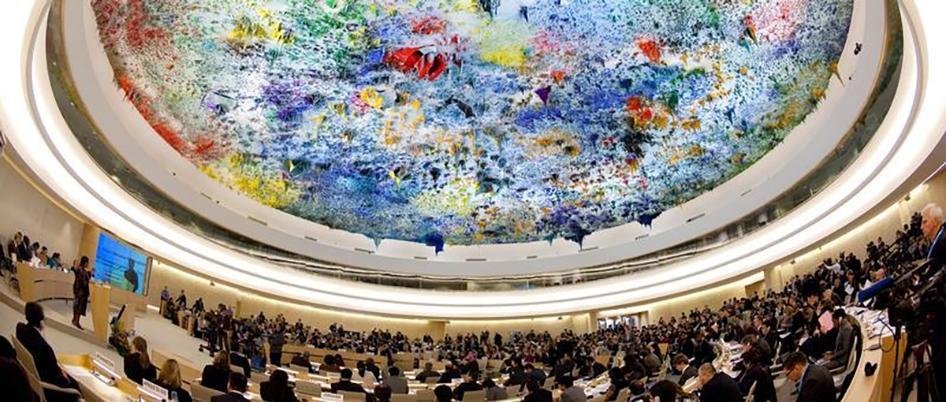Turkey: PEN joint submission to the UN Universal Periodic Review
The Human Rights Council in Session
More than three years since Turkey’s 2016 failed coup and one year after its state of emergency was lifted, its government continues its relentless and pervasive crackdown on civic space, media freedom and dissenting voices.
Turkey’s human rights record will come under review by the UN Human Rights Council during the Universal Period Review (UPR) mechanism in January 2020. Ahead of the review, ARTICLE 19, P24, PEN International, English PEN, Reporters Without Borders (RSF), International Press Institute (IPI), Freemuse, European Centre for Press and Media Freedom (ECPMF), IFEX and Norwegian PEN have made a submission to the UPR.
Amongst the report’s key recommendations are to urge Turkey to restore the rule of law and impendence of the judiciary, to release all jailed journalists and to drop the hundreds of baseless charges against journalists, artists, civil society actors and academics.
During its last review by the UN in 2015, Turkey accepted 19 recommendations to improve freedom of expression, but human rights have since rapidly deteriorated with thousands of journalists, academics, artists and members of civil society facing ‘trumped-up’ politically-motivated charges of ‘terrorism’ and ‘attempting to overthrow the constitution’.
The joint submission highlights five key areas of concern:
Erosion of rule of law leading to mass persecution of journalists
Turkey’s judicial independence has been massively damaged due to increasing governmental pressure on judges and judicial organs which creates a stark contravention of international standards. This assault on judicial independence eroded the rule of law, with judges in fear of reprisals if they fail to rule in favour of the government in politically motivated trials. It has also led to hundreds of arbitrary arrests, detentions, and unfair trials of journalists and civil society actors.
The absence of domestic remedy
Following the government’s dismissal of 130,000 civil servants and public officials after the failed coup, there has been no effective remedy for redress. While the government established an Inquiry Commission to review appeals in May 2017, of the 126,000 applications made only 5,250 have led to a reinstatement (as of May 2019). ARTICLE 19 and partners believe that no effective remedy exists in Turkey to challenge politically motivated dismissals and closures of media outlets, contrary to Turkey’s obligations under international law.
Problematic defamation and counter-terrorism laws used to quash dissenting voices
Our report challenges a number of freedom of expression issues retained in the Turkish Penal Code, particularly those relating to ‘defamation’ and ‘insult’ against public officials or beliefs, levying penalties of at least one year in prison. Provisions criminalising insult of the President are deeply concerning and are frequently misused to silence criticism of the President or government bodies, landing scores of journalists, artists, and academics with fines and prison sentences.
Pervasive crackdown on media freedom
Independent media has been all but wiped out in Turkey. Under State of Emergency Decrees at least 170 media outlets including publishing houses, newspapers and magazines, news agencies, TV stations and radios were closed on charges of spreading “terrorist propaganda”. Turkey’s mass liquidation of media outlets without independent, timely judicial review are unacceptable under international law. For the last three years, Turkey has been the world’s most prolific jailor of journalists. There are currently at least 140 journalists and media workers in detention; at least 300 have been detained since the imposition of the state of emergency and hundreds more are on trial.
Mass blockings of websites and platforms
Access to thousands of websites and platforms have been banned in Turkey after the government triggered a state of emergency decree to authorise government removals and blockings of websites without judicial oversight, a severe violation of international standards. As of December 2018 more than 10 VPN services and at least 3,000 online articles were subject to judicial blocking orders. Wikipedia has been blocked since 2017 after it refused to remove content alleging the Turkish government supported militant groups in Syria. YouTube was temporarily banned in 2015 for the same reason.
The partners highlight these concerns in detail in the submission, and propose concrete recommendations that States must direct to Turkey during the upcoming Universal Periodic Review in January 2020, to ensure the right to freedom of expression in the country.
To view the submission click here.
For further details contact Aurélia Dondo at PEN International, Koops Mill, 162-164 Abbey Street, London, SE1 2AN, UK Tel: +44 (0) 20 7405 0338 email: [email protected]

